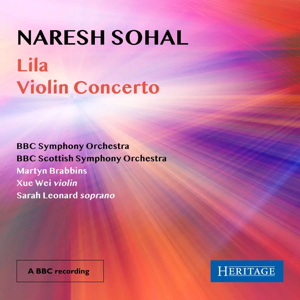
Naresh Sohal (1939-2018)
Lila (1996)
Violin Concerto (1986)
Sarah Leonard (soprano), Xue Wei (violin)
BBC Symphony Orchestra/Martyn Brabbins(Lila)
BBC Scottish Symphony Orchestra/Martyn Brabbins (Concerto)
rec. live 24 October 1992, BBC Broadcasting House, Glasgow, UK (Concerto), 13 October 1996, Royal Festival Hall, London, UK (Lila)
Reviewed from a stream on Apple Music
Heritage Records HTGCD133 [79]
Earlier this year Heritage released remastered BBC recordings of two of Naresh Sohal’s major orchestral works, The Wanderer (1981) and Asht Prahar (1965) (HTGCD135 – review). This new disc gives us two more: his Concerto for Violin and Orchestra from 1986 and Lila from 1996, again giving the opportunity to understand Sohal’s development as a composer at different stages of his career. Martyn Brabbins conducts both, with BBC forces.
The Violin Concerto was written when Sohal was living in Scotland for a period and is very different sonically from the two works on the earlier Heritage release, more tonal in some respects, and neoromantic in both mood and idiom at times. Kyung Wha Chung was the intended soloist but she injured her wrist prior to the performance, and Xue Wei, who was then a professor at the Royal Academy, took her place. It’s a beautiful, rhapsodic work with a lot of the solo writing placed in the upper register of the violin. Xue Wei’s playing is heart stoppingly gorgeous and profoundly contemplative, and Brabbins and the BBC Scottish Symphony Orchestra are the perfect accompanists. Think of The Lark Ascending reimagined for the 1980s and you will get some kind of orientation for this work. Sadly, in what is a bit of a recurring pattern for Sohal’s music, the performance on this recording is the only one to have taken place to date.
The second work, Lila, written a decade after the Violin Concerto sess Sohal looking to Indian philosophy for inspiration. ‘Lila’ is a Sanskrit word meaning the play of Nature and the structure of the piece is provided by yogic philosophy which states that, in human beings, creative energy rises from the base of the spine to the top of the head through seven ‘chakras’ or nodes. It’s a profoundly imaginative score, both deeply thoughtful and thought provoking. Several characteristics of Sohal’s music reappear here in progressive form: the mood is again one of quasi romanticism as in the Concerto but we also hear again the use of quarter tones as in Asht Prahar and, as in that piece, there is the use of a soprano voice, again wordless, towards the end. The seven sections of the piece are progressively shorter and distinctively scored, from a sound world of brass and percussion in ‘Earth’ and ‘Water’ to the brilliant use of full orchestra to devastating effect in the final section. Here, Sarah Leonard somehow manages to soar effortlessly over the BBC Symphony Orchestra to mesmerising effect. It’s another striking, highly individual composition. Martyn Brabbins (a highly capable last minute replacement for the score’s dedicatee Andrew Davis) again does a wonderful job of realising of the music with his skilled forces. One critic wrote after that performance, ‘Play it again, BBC, as soon as possible.’ I’m not sure if that ever happened.
In her beautifully written booklet notes for the Heritage discs, Janet Swinney, Sohal’s widow and overseer of his estate writes: ‘Although Sohal’s work has received many performances, there are still important pieces wating to be explored. And there are many significant and intriguing works that have not had the number of performances they deserve.’ Such dignity, when what I will again call the late neglect of Sohal’s music seems baffling. The two Heritage discs and the recent Toccata Classics release of most of the Sohal String Quartets (TOCC0754, review) could go a long way to alerting promoters, performers, audiences to what they are missing. I hope they find the wide audience they merit.
Dominic Hartley
Buying this recording via a link below generates revenue for MWI, which helps the site remain free.



















